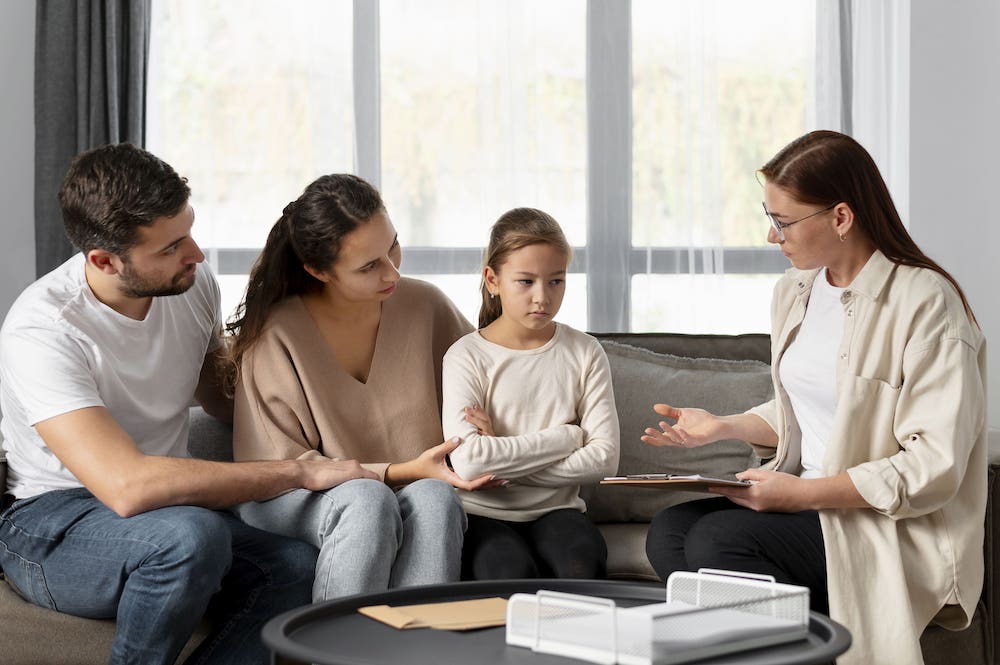In previous posts, I’ve shared how family therapy fosters collaborative dialogue—a way of speaking and listening that builds emotional safety, deepens connection, and makes it easier to solve problems together.
Most people begin family therapy hoping to resolve specific challenges: emotional distance, parenting disagreements, financial tension, in-law stress, or behavioral issues with children. While your therapist will help you address these issues, a key part of the work often involves changing how you communicate with one another.
When conversations become more collaborative, families tend to experience less blame and reactivity, more trust and empathy, and emotional safety. I’ve written about how therapists help families reach these outcomes by reframing negative patterns, asking relational questions, guiding interactive exercises, and highlighting strengths. Today, I want to focus on another potent technique you may encounter in family therapy that helps develop collaborative dialogue: doubling.
What Is Doubling?
Developed by couples therapist Dan Wile, adapted from techniques initially used in psychodrama, and expanded upon by family therapist Uri Weinblatt, doubling involves the therapist temporarily speaking as if they were you, putting into words the heartfelt messages that might be hiding underneath your frustration, anxiety, or anger.
When a therapist “doubles” for you, they’ll often check in: “Does that capture what you’re feeling?” “Where is that right and where is that wrong?”, collaborating with you to find a voice that expresses what’s beneath the surface, especially when that voice is challenging to access during moments of emotional intensity.
Example: Doubling for a Teen
Let’s say you are a parent, and your teen says sharply to you:
“You never let me do what I want. You just want to control me!”
Rather than jumping into problem-solving, the therapist might ask the teen:
“Would it be okay if I try putting into words what I hear behind that?”
Then, speaking for the teen, the therapist says to you, in a kinder, engaged voice:
“I know you say yes sometimes—you took me to the water park last week. I just wish you’d show that you value my opinion more, like when you insist on an 8:30 bedtime without even asking what I think.”
The therapist then checks back in with the teen:
“How does that sound? How does that fit with what you mean?”
This process helps the teen feel understood and increases the likelihood that the parent can hear their message without defensiveness. The conversation softens, the emotional charge lowers, and an impasse becomes a springboard for more understanding.
Example: Doubling for a Parent
Doubling can also help parents who feel overwhelmed or unheard. Imagine a parent says in session:
“I can’t deal with him not listening. He’s just oppositional.”
The therapist might ask the parent:
“Can I put words to what I’m hearing behind that?”
Then, speaking for the parent and turning to the child, the therapist says:
“I know you need independence. I want to give you choices, but I also want my voice to matter. Would you mind hearing my perspective?”
The therapist then checks in with the parent as they work together to refine the communication.
This process helps the parent feel more connected to their deeper longings. It also invites the child to hear the vulnerable sentiments behind the parent’s frustration, often leading to a shift in how they respond.
Why Doubling Works
When done well, doubling:
- Highlights hidden emotions
- Reduces blame and invites curiosity
- Softens defensiveness
- Models compassionate, relational language
- Encourages reflection and emotional growth
- Builds empathy and strengthens bonds
Finding Your Collaborative Voice
Clients who experience doubling often find it deeply affirming. It doesn’t feel like being corrected. It feels like being heard, clarified, and guided toward the kind of conversation that brings closeness and feelings of security.
Through family therapy that involves doubling, you may even find yourself naturally speaking in that collaborative voice—one that helps you and your family feel safer, more connected, and more understood.
-Posted by Jonah Green
Jonah Green, a therapist at Jonah Green and Associates, LLC, offers therapy services for children, teens, families, and adults in North Bethesda, Maryland, serving clients in Montgomery County, DC, and the surrounding areas.
